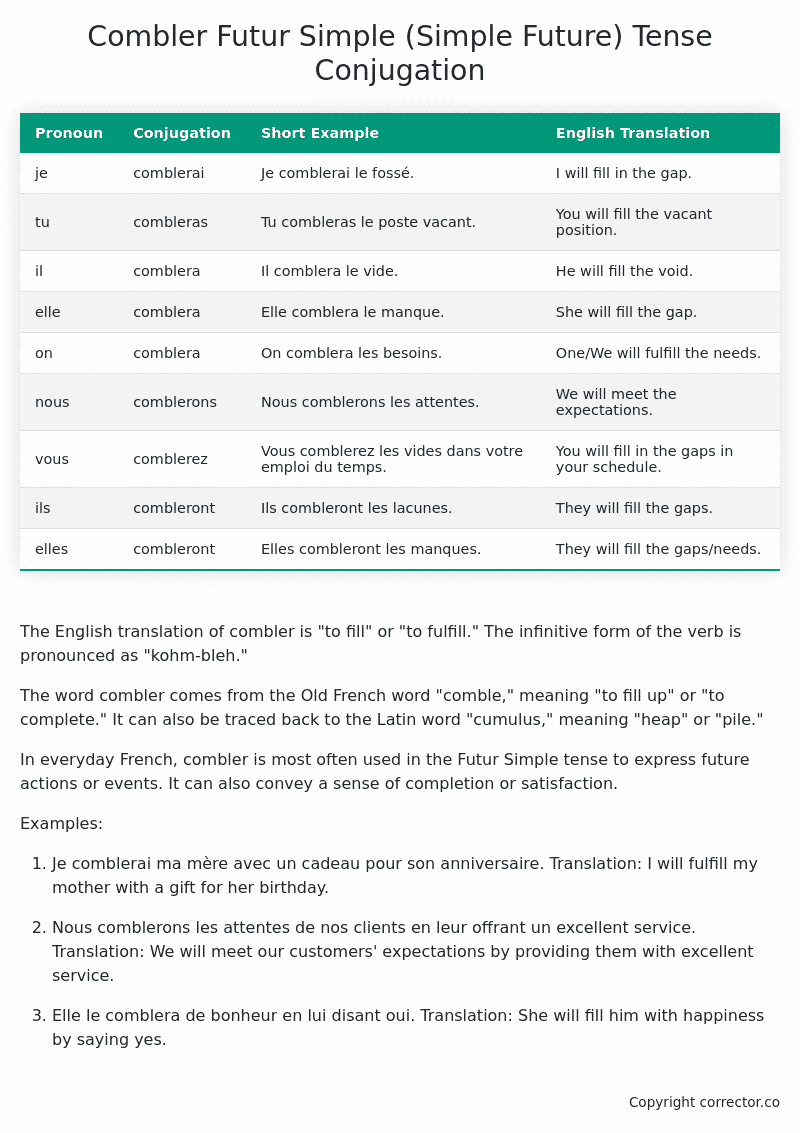Futur Simple (Simple Future) Tense Conjugation of the French Verb combler
Introduction to the verb combler
The English translation of combler is “to fill” or “to fulfill.” The infinitive form of the verb is pronounced as “kohm-bleh.”
The word combler comes from the Old French word “comble,” meaning “to fill up” or “to complete.” It can also be traced back to the Latin word “cumulus,” meaning “heap” or “pile.”
In everyday French, combler is most often used in the Futur Simple tense to express future actions or events. It can also convey a sense of completion or satisfaction.
Examples:
-
Je comblerai ma mère avec un cadeau pour son anniversaire.
Translation: I will fulfill my mother with a gift for her birthday. -
Nous comblerons les attentes de nos clients en leur offrant un excellent service.
Translation: We will meet our customers’ expectations by providing them with excellent service. -
Elle le comblera de bonheur en lui disant oui.
Translation: She will fill him with happiness by saying yes.
Table of the Futur Simple (Simple Future) Tense Conjugation of combler
| Pronoun | Conjugation | Short Example | English Translation |
|---|---|---|---|
| je | comblerai | Je comblerai le fossé. | I will fill in the gap. |
| tu | combleras | Tu combleras le poste vacant. | You will fill the vacant position. |
| il | comblera | Il comblera le vide. | He will fill the void. |
| elle | comblera | Elle comblera le manque. | She will fill the gap. |
| on | comblera | On comblera les besoins. | One/We will fulfill the needs. |
| nous | comblerons | Nous comblerons les attentes. | We will meet the expectations. |
| vous | comblerez | Vous comblerez les vides dans votre emploi du temps. | You will fill in the gaps in your schedule. |
| ils | combleront | Ils combleront les lacunes. | They will fill the gaps. |
| elles | combleront | Elles combleront les manques. | They will fill the gaps/needs. |
Other Conjugations for Combler.
Le Present (Present Tense) Conjugation of the French Verb combler
Imparfait (Imperfect) Tense Conjugation of the French Verb combler
Passé Simple (Simple Past) Tense Conjugation of the French Verb combler
Passé Composé (Present Perfect) Tense Conjugation of the French Verb combler
Futur Simple (Simple Future) Tense Conjugation of the French Verb combler (this article)
Futur Proche (Near Future) Tense Conjugation of the French Verb combler
Plus-que-parfait (Pluperfect) Tense Conjugation of the French Verb combler
Passé Antérieur (Past Anterior) Tense Conjugation of the French Verb combler
Futur Antérieur (Future Anterior) Tense Conjugation of the French Verb combler
Subjonctif Présent (Subjunctive Present) Tense Conjugation of the French Verb combler
Subjonctif Passé (Subjunctive Past) Tense Conjugation of the French Verb combler
Subjonctif Imparfait (Subjunctive Imperfect) Tense Conjugation of the French Verb combler
Subjonctif Plus-que-parfait (Subjunctive Pluperfect) Tense Conjugation of the French Verb combler
Conditionnel Présent (Conditional Present) Tense Conjugation of the French Verb combler
Conditionnel Passé (Conditional Past) Tense Conjugation of the French Verb combler
L’impératif Présent (Imperative Present) Tense Conjugation of the French Verb combler
L’infinitif Présent (Infinitive Present) Tense Conjugation of the French Verb combler
Struggling with French verbs or the language in general? Why not use our free French Grammar Checker – no registration required!
Get a FREE Download Study Sheet of this Conjugation 🔥
Simply right click the image below, click “save image” and get your free reference for the combler Futur Simple tense conjugation!

Combler – About the French Futur Simple (Simple Future) Tense
Formation of Futur Simple
For regular -er verbs (e.g., parler – to speak)
For regular -ir verbs (e.g., finir – to finish)
For regular -re verbs (e.g., vendre – to sell)
Common Everyday Usage Patterns
Conditional Statements
Interactions with Other Tenses
Futur Antérieur
Conditional
Present
Summary
I hope you enjoyed this article on the verb combler. Still in a learning mood? Check out another TOTALLY random French verb conjugation!


